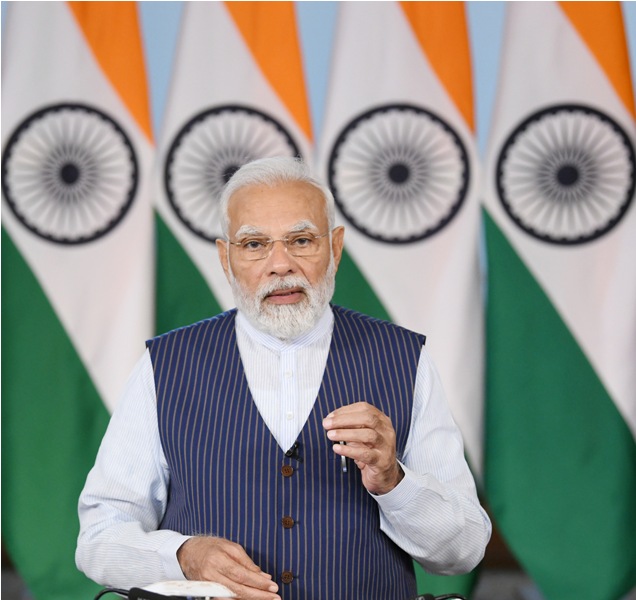
Prime Minister Modi said on Tuesday that India has emerged as the global economy’s “bright spot” and is playing a key role in the supply chain, urging stakeholders to seize this opportunity and urging financial institutions to lower the cost of credit, increase the pace of credit disbursement, and reach out to small entrepreneurs.
He added that the robust Indian financial system has increased responsibilities as the country moves forward with new capabilities, after being on the verge of collapse eight to ten years ago.
PM explained that the post-budget webinars, an annual practice since 2021, help the government in inculcating “collective ownership” and rope in all stakeholders in the spirit of “equal partnership”. So far, he has spoken at seminars on topics such as green growth, agriculture and cooperatives, harnessing youth power, reaching the last mile, ease of living, urban development, mission-driven tourism, infrastructure, and health.
On February 10, Union Finance Minister Nirmala Sitharaman assured the Rajya Sabha that banks and financial systems are now stable after the Modi government ended the ‘dial-a-loan’ scheme that existed before May 2014.
In April 2015, the government also launched an Asset Quality Review (AQR) to uncover hidden non-performing assets (NPAs) to strengthen the Indian banking sector, which is dominated by public sector banks. As a result, 12 PSBs declared a net profit of 25,685 crores in the second quarter of FY23 and a total of 40,991 crores in the first half of FY23, representing a 50% and 31.6% year-on-year increase, respectively. The 2015 AQR increased PSB non-performing assets (NPAs) from 2.17 lakh crore on March 31, 2014, to 8.96 lakh crore on March 31, 2018, owing primarily to indiscriminate lending.
As an example of the government’s support for micro, small, and medium-sized enterprises (MSMEs), Modi asked the banking system to reach out to as many sectors as possible. During the pandemic, the government assisted over 1.20 crore MSMEs, he said.
“In this year’s budget, the MSME sector received an additional 2 lakh crore in collateral-free guaranteed credit. Our banks must reach out to them and provide them with adequate financing,” he added.
Referring to the government’s emphasis on financial inclusion through the ‘JAM Trinity’ (Jan-Dhan accounts, Aadhaar identification, and mobile coverage), the Prime Minister emphasized that crores of people had now entered the formal financial system and urged policymakers, banks, and the financial sector to “re-engineer” processes “to reduce the cost and increase the speed of credit” so that it reaches small entrepreneurs quickly.
He claimed that the government has aided millions of young people by providing Mudra loans worth over Rs 20 lakh crore without a bank guarantee. For the first time, banks assisted over 40 lakh street vendors and small shopkeepers through the PM Swanidhi Yojana.
PM Modi also invited the private sector to invest at the same rate as the government, highlighting that the capital expenditure outlay in Budget 2023-24 has been increased to 10 lakh crore. “Today, I would also call on the private sector of the country, just like the government, to increase their investment so that the country benefits the most,” he said.
Sitharaman described the capital investment as a “driver of growth and jobs” in her Budget speech, and increased the outlay by 33% to 10 lakh crore. “The direct capital investment by the Centre is complemented by the provision made for the creation of capital assets through Grants-in-Aid to States. “The Centre’s ‘Effective Capital Expenditure’ is budgeted at 13.7 lakh crore or 4.5% of GDP,” she said on February 1.
In response to the government’s policy of lowering tax rates to increase revenue collection, PM Modi stated that the tax burden has significantly decreased since the implementation of the Goods and Services Tax (GST) in July 2017, as well as the reduction of personal and corporate income tax rates.
“In 2013-14, gross tax revenue was approximately 11 lakh crore, which is expected to increase to 33 lakh crore in 2023-24 [Budget Estimates], representing a 200% increase,” he said.
He also stated that the tax base has grown, with the number of individual tax returns increasing to 6.5 crores in 2020-21 from 3.5 crores in 2013-14. “Paying taxes is a duty that is directly related to nation-building. “The increase in the tax base demonstrates that people have faith in the government and believe that the taxes they pay are being spent for the public good,” he said.








